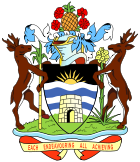You can help expand this article with text translated from the corresponding article in Spanish. (March 2024)Click [show] for important translation instructions.
|
| |||||||||||||||||||||||||
All 8 elected seats in the Legislative Council 5 seats needed for a majority | |||||||||||||||||||||||||
|---|---|---|---|---|---|---|---|---|---|---|---|---|---|---|---|---|---|---|---|---|---|---|---|---|---|
| Turnout | 70.33% | ||||||||||||||||||||||||
| |||||||||||||||||||||||||
 | |||||||||||||||||||||||||
 |
|---|
General elections were held in Antigua and Barbuda on 20 December 1951. [1] The election was the first in Antigua and Barbuda to be held under universal suffrage. [2] Vere Bird formed the Antigua Labour Party in 1951 and led the party to victory, winning all eight elected seats on the legislative council. [3] Voter turnout was 70%. [1]
